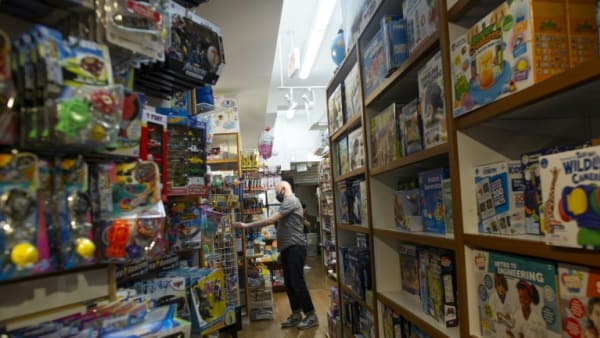Global supply snags could mean fewer toys under the Christmas tree

NEW YORK: It's always "better to shop a little early" for the holidays, but this year, says Judy Ishayik, co-owner of a New York toy store, "We are telling people to shop for Christmas in September."
Global shipping snags are causing shortages, delivery delays and price increases - all headaches for toy stores and manufacturers.
Ishayik's store, Mary Arnold Toys, has been selling toys for 90 years in the upscale Upper East Side section of Manhattan.
At first glance, the shelves appear well-stocked. But at the back of the store and in the basement where the inventory is stored, there is a lot of empty space.
STRUGGLING TO ADAPTLike many other sectors of the US economy working to get back to normal following the upheaval caused by the COVID-19 pandemic, toymakers and speciality stores have been trying to adapt, while struggling to replenish their supplies.
Some factories were forced to shut down during coronavirus outbreaks, impacting manufacturing.
And shippers have been overwhelmed by demand from online sales, exacerbated by a shortage of shipping containers, while in some ports, boats wait several days to unload their goods.
In the United States, trucking firms are struggling to recruit drivers.
A feeling of panic was brewing ahead of the holiday season last year, with some retailers concerned that overwhelmed delivery firms like UPS or FedEx would not be able to get packages to customers on time.
But those fears proved to be exaggerated.
In the end, families shopping for dolls, board games and building blocks for children stuck at home helped US toy sales jump by 16 per cent in 2020, according to market research firm NPD.
NOT ENOUGH BOATSBut with supply chains disrupted for over a year now, delays have piled up, said Jennifer Blackhurst, a supply chain specialist at the University of Iowa.
"It's not impacting just one industry or just one product type. It's affecting companies across the board and they are all competing to get the shipping capacity," she told AFP.
She warns the situation is unlikely to return to normal before next year.
Hasbro, maker of Transformers figures and the iconic Monopoly board game, is keenly aware of the problem and "working to ensure product availability during the holiday season", chief financial officer Deborah Thomas said recently.
The company placed holiday orders earlier, and diversified its sources, ports and carriers.
But that comes at a cost: Sea freight rates have quadrupled compared to the start of the year, Thomas said, which means Hasbro will have to increase its prices in the third quarter.
Mattel, which makes the famous Barbie dolls, also is working to ensure it will be able to meet the demand, CEO Ynon Kreiz said.
"Of course," he acknowledged, "there could be still unanticipated supply chain challenges and it's hard to tell what the future may hold."
NOT ENOUGH LEGOSWhile multinationals can rely on their extensive networks, small businesses cannot.
The Toy Association, an industry trade federation, launched a resource centre at the end of July to help members navigate the shipping crisis, which it says could continue into 2022.
"With 85 per cent of toys sold in the US being manufactured overseas" companies face "exorbitant increases in shipping rates", the organisation said in a recent letter to legislators.
Due to the shortage of containers and space available on ships, "Many members have products stranded overseas."
For firms like Mary Arnold Toys, even planning ahead and finding alternatives is no guarantee.
Ezra Ishayik, purchasing manager for the shop, placed an order with Lego for US$60,000 of the popular plastic building sets, but received only US$20,000 worth of goods due to a lack of supply.
"We're ordering the maximum because of all the companies that can't guarantee they can give us merchandise in October, November," he said.
Blackhurst was still confident there will be toys under the Christmas tree, but said bottlenecks remain.
A global semiconductor crunch could hit the supply of electronic toys and gadgets, while a shortage of wood for furniture means "you're talking about months and months of waiting", she said.
0 Response to "Global supply snags could mean fewer toys under the Christmas tree"
Post a Comment